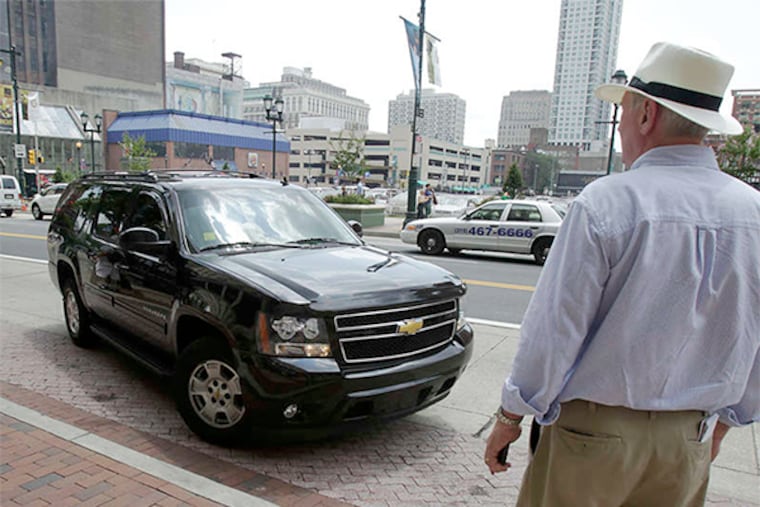A fare fight, via Harrisburg
Uber and Lyft are making a concerted push to bring their ride-share services to Philadelphia, sparking opposition from local taxi owners and drivers and setting the stage for a legislative fight in Harrisburg this week.

Uber and Lyft are making a concerted push to bring their ride-share services to Philadelphia, sparking opposition from local taxi owners and drivers and setting the stage for a legislative fight in Harrisburg this week.
"We'll be here within weeks," Uber spokesman Taylor Bennett predicted confidently Thursday, a day before Uber representatives met with regulators at the Philadelphia Parking Authority.
Ride-share services like UberX and Lyft connect people looking for rides with private car owners looking for extra money. Their phone apps allow riders to summon cars, pay for the service, and get receipts, all electronically.
(An upscale version of Uber, known as Uber Black, is already available in Philadelphia, operating as an electronically summoned SUV limousine service.)
In their push to recruit drivers and passengers around the country and abroad, the ride-share companies have ignited an intense debate about competition, driver pay, and safeguards for passengers, including questions about criminal background checks, insurance policies, and driver qualifications.
In July, Uber and Lyft won temporary authority to operate in Pittsburgh and Allegheny County, after initially operating in defiance of a ban by the Pennsylvania Public Utility Commission, which regulates taxis outside Philadelphia.
The Philadelphia Parking Authority regulates city taxi and limousine services. So far, it has blocked ride-shares as unlicensed taxis. But proposed laws, set for a vote in a State House committee Tuesday, could significantly change the landscape.
HB2468, a bill by Rep. John Maher (R., Allegheny), would establish rules for "transportation network services," including insurance requirements, criminal background checks, and accident histories.
The bill's standards would include Philadelphia, but other lawmakers - and cab operators and drivers - have argued to carve out Philadelphia from the legislation.
They contend Philadelphia, as the only Pennsylvania city with a taxi-medallion system requiring each taxi owner to buy a medallion now costing more than $500,000, should have different requirements. Parking Authority officials are urging lawmakers to exempt Philadelphia from the bill.
At the same time, the PPA is scrambling to bring Uber-style innovations to city taxis, such as phone apps to hail cabs electronically.
"Cab service in Philadelphia is going to have to get better," acknowledged Dennis Weldon, general counsel for the PPA. He said the Parking Authority would soon ask for bidders to provide a universal phone app for all cabs in the city.
(Two major Philadelphia taxi-dispatch companies already have created phone apps to summon taxis: 215-GET-A-CAB and Freedom Taxi.)
Also, the PPA will move to require newer, bigger, and more wheelchair-accessible taxis, Weldon said. Forty-five accessible taxis will be licensed by the end of the year.
Ride-share companies, and their legislative supporters, see that as too little, too late.
Uber wants statewide standards, which could be enforced in Philadelphia by the PPA, said Uber spokesman Bennett.
Rep. Brian Sims, a freshman Philadelphia Democrat who is a cosponsor of Maher's bill, said such exemptions "are usually a way to shortchange the residents of the city of Philadelphia."
"Options and variety and competition are key," Sims said. "It lets me decide what kind of car I want to get in. If we do see that Philadelphia is carved out, it would be a sad statement about the power structures of Philadelphia."
And Uber, which last week urged its considerable following of users and drivers to contact state lawmakers in support of ride-sharing legislation, said it would offer this week to provide wheelchair-accessible rides.
Cab owners and drivers, meanwhile, urge legislators to require the same regulations for ride-share companies as for traditional taxis, to prevent unfair competition.
"It's going to be chaotic," said Ronald Blount, president of the Taxi Workers Alliance of Pennsylvania. "You can't deregulate a new sector and keep the handcuffs on the old sector."
In San Francisco, home of Uber and Lyft, the number of trips taken by taxi plummeted 65 percent in just 15 months after the arrival of the ride-share services, according to a report presented to the San Francisco Municipal Transportation Agency board last week.
In Harrisburg, the House Consumer Affairs Committee is slated to vote on ride-share proposals Tuesday. But with only eight legislative days left before November elections, some lawmakers think a decision will be put off till next year.
"It might get over to the Senate, and it might not make it out," said Rep. Thomas Killion (R., Chester/Delaware), sponsor of a ride-share bill, HB2445, supported by the taxi industry and the PPA that would carve out Philadelphia.
215-854-4587 @nussbaumpaul